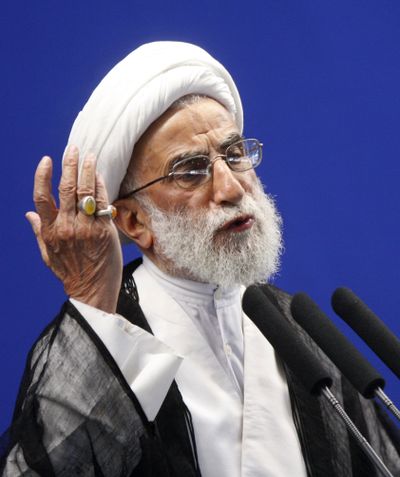Iran cleric: Trials coming
Britain accused of encouraging protest

A powerful cleric said Friday that Iran will put British Embassy staffers on trial for fomenting post-election turmoil, a step that would likely increase Iran’s isolation and alienate Western nations that have been trying to keep options open with Tehran despite its crackdown on protesters.
The announcement fueled calls in Europe for tougher action against Tehran. Britain is pressing for members of the European Union to pull their ambassadors out of Tehran to protest the staffers’ arrests last week.
The standoff is a test of how far Iran’s clerical rulers are willing to go to shore up their position at home after the wave of protests – even if they risk wrecking possibilities for dialogue between Tehran and the West, a major policy goal of President Barack Obama that Tehran cautiously welcomed.
After quashing the street demonstrations, Iran’s leadership has been trying to erase any lingering doubts about the legitimacy of President Mahmoud Ahmadinejad by portraying the unrest as sparked by foreign meddling, not by public anger over the June 12 election, which the protesters said was fraudulent. Prosecuting the detained Iranian members of the British Embassy staff could help boost its case before the Iranian public.
At the same time, the arrests test the U.S. and Europe’s policy, which has so far been to avoid an overly harsh reaction to Iran’s post-election crisis. The West has been wary of condemnations of Iran’s leadership, in part for fear of undermining prospects for future talks with Tehran, particularly over its controversial nuclear program.
So far, the EU has taken an incremental approach. On Friday, a day after issuing a public call for the staffers’ release, governments across the 27-nation bloc summoned Iran’s ambassadors to present the demand in person.
French President Nicolas Sarkozy said his country backs Britain’s push for tougher action, “so that Iranian leaders will really understand that the path that they have chosen will be a dead end.”
British Foreign Secretary David Miliband said his country is “deeply concerned” about the personnel, who he said “have not engaged in any improper or illegal behavior.”
Word of the trials came from Ayatollah Ahmad Jannati, an ultra-conservative who is one of the most prominent figures in Iran’s clerical leadership and is close to the country’s supreme leader.
Jannati took a tough line in a sermon to thousands of worshippers attending Friday prayers at Tehran University, accusing Britain of being behind the protests.
London “designed a velvet revolution” to topple Iran’s Islamic government and the detained staffers confessed to their role, he told the crowd, where some chanted slogans against the U.S. and Israel.
“In these events, their embassy had a presence,” he said. “Some people were arrested. Well, inevitably, they will be put on trial.”
He did not say how many staffers will be tried or on what charges. Earlier Iranian officials said all but one of the nine embassy personnel originally arrested had been released, but British officials say two are being held.